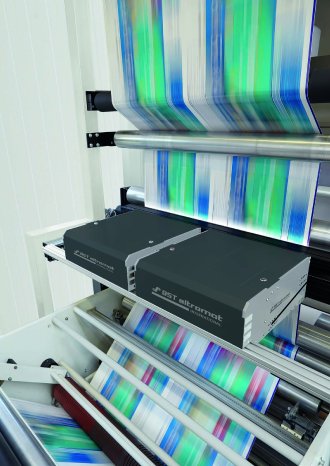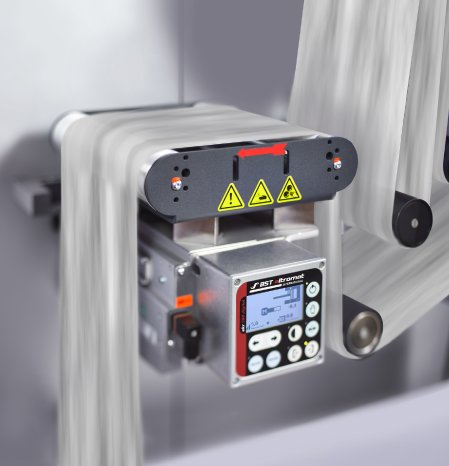“Even in the fast growing markets of the emergent countries in Asia and South America many BST eltromat systems for web guiding are used in the nonwoven industry. At index17, we will meet e.g. many Chinese machine manufacturers which are active in this market and rely on our company and our products,” explains Ingo Ellerbrock, head of product management at BST eltromat. “For these customers it is important that we have a worldwide presence with our subsidiaries – to be wherever the nonwoven market is growing the strongest. Our subsidiary in Shanghai, China produces e.g. web guiding systems on a grand scale for our Asian nonwoven clients.”
Precise, simultaneous control of multiple webs
BST eltromat web guiding systems are mainly used in machines which process nonwoven materials into hygiene products, such as diapers, sanitary pads and other hygienic articles. Several narrow webs of various light materials are fed through a multitude of process stages, such as ultrasonic printing, stamping and embossing at low web tension and at speeds of up to 1,000 m/min. Then they are wound up, later unwound and assembled into the end products. This is where the web guiding system is needed, to ensure that the webs run through the process in a controlled way and thus meet the necessary quality. Some of these machines have up to 20 web guiding systems. If requested by customers, BST eltromat network these systems. This is how these complex machines reach a high level of automation simply and effortlessly.
In the nonwoven industry, BST eltromat web guiding systems are not only used for further processing but also in slitter applications that cut the nonwoven material into narrower webs. Here the web guiding systems ensure that the individual material webs are precisely wound up after being cut.
Customers of BST eltromat have a choice of web guiding systems according to their technical and economic requirements for cutting or processing nonwoven materials. They can choose among eco-variants, basic systems and high-end solutions which can be easily adjusted to specific tasks upon request. The company’s scope of supply for web guiding in the nonwoven industry e.g. includes various web edge sensors, actuators, web guiding devices and coatings for the guide rollers. This way BST eltromat covers the enormous range of materials processed in this market.
Even the CompactGuide to be shown in Geneva can be equipped with various optical web edge sensors, splice tables and clamping devices and therefore is very versatile. Its controller makes it extremely easy to operate, which is a decisive criteria for all operators. The intuitive operation is constructed in a logical way and at first glance, the operator sees whether the materials are being properly controlled. The EcoGuide is also very common in the nonwoven industry. It is a particularly cost-efficient and compact web guiding system which can be put into operation fast and easily via the plug-and-play function just like the CompactGuide web guiding system.
If nonwoven materials with various web widths are processed, BST eltromat wide array sensors are also used. Due to their large measurement area, these tried and tested, wear-free and thus maintenance-free web edge sensors do not need to be mechanically adjusted or aligned in case of varying web widths. In addition, during operation they automatically compensate for environmental influences such as dust pollution or fluctuation in temperature.
Modular quality control for printed nonwoven articles
The visitors at index can also learn about BST eltromat’s iPQ-Center. This modular system offers extensive possibilities for quality assurance in order to achieve the best production results. iPQ-Check, the module for 100% inspection, represents the whole iPQ-Center and will be the highlight by BST eltromat in this sector in Geneva. Manufactures of nonwoven products are increasingly using iPQ-Check on printing machines which print hygiene articles such as diapers and sanitary pads. High-speed image acquisition provided by high performing color line scan cameras is used for monitoring the print quality across the entire printing format for web widths up to 2,800 mm. The early detection of defects, reduces waste and ensure that their customers’ quality requirements are met without compromise. “The nonwoven industry, with its typically soft materials which tend to stretch in the processing direction or sideways – proves a particular challenge for the printing process. The inspection systems used in this context must recognize these deformities to a certain extent and take them into consideration during quality control. iPQ-Check meets these special requirements in an outstanding way,” explains Volker Reinholdt, product manager 100% inspection at BST eltromat. iPQ-Check is quickly set-up and easy to use for the operator thanks to its intuitive menu structure with gesture control.




